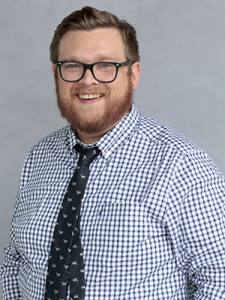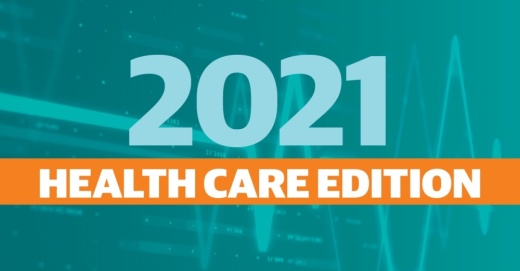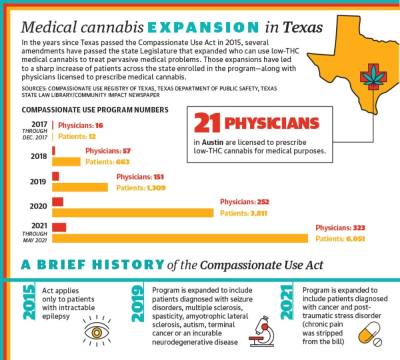This expansion of the Compassionate Use Program—first enacted in 2015—will open the door for potentially thousands of new patients statewide to access medical cannabis prescriptions.
Through House Bill 1535, which passed the Texas Senate on May 31, the Compassionate Use Program will now include provisions for patients with post-traumatic stress disorder and patients with cancer to possibly acquire prescriptions for medical cannabis.
“Those groups will include enormous numbers of patients,” said Dr. Karen Keough, the chief medical officer for Austin-based medical cannabis dispensary Texas Original Compassionate Cultivation. Keough further serves as an associate professor of pediatrics at Texas A&M University.
The state medical cannabis program previously covered patients diagnosed with seizure disorders, multiple sclerosis, spasticity, amyotrophic lateral sclerosis, autism, terminal cancer or an incurable neurodegenerative disease. When the act was first introduced six years ago, it applied only to patients with intractable epilepsy.
Since the first expansion of the act in 2019, more than 4,500 new patients have acquired prescriptions through the Compassionate Use Program, according to annual reports from the Texas Department of Public Safety.
Dr. Jeffrey Kane, a child neurologist at Child Neurology Consultants of Austin, said he has seen encouraging results in pediatric patients with prescriptions for medical cannabis with different kinds of maladies.
“In epilepsy there is very good data there. We know for certain it is effective to treat childhood seizures,” Kane said. “The use in autism is less clear, but I’ve become persuaded by its usefulness just by seeing my patients. ... It doesn’t cure autism, but I have seen significant improvements in behavioral outbursts and agitation [and] speech in kids with limited skills.”
Kane cautions that medical cannabis is not a cure-all for patients. The pediatric physician instead emphasizes medical cannabis prescriptions are but one tool in a large tool box, especially for children with chronic seizures.
“With epilepsy, we see a lot of families that want [cannabidiol] instead of traditional medicine, and I think that may be further than I feel comfortable going,” Kane said.
However, Kane also noted that children with autism seem to have more successful outcomes with prescriptions of medical cannabis with higher concentrations of tetrahydrocannabinol, or THC. That is the main psychoactive compound in cannabis.
The Texas Legislature amended an early draft of HB 1535 that would have upped the THC level in medical cannabis prescription to a maximum concentration of 5%—up from 0.5% as stipulated in the initial 2015 act. With the amendment, the expansion includes a provision for a maximum concentration of 1%. The law goes into effect Sept. 1.
“The concentration is not going to have an impact on what I prescribe as a total daily dose, but it will have an impact on what my patient has to ingest to get that same daily dose,” Keough said. “It is a false concept to think that higher concentrations will lead to people taking more intoxicating doses.”
MEDICAL CANNABIS OUTLOOK
Currently, there are 21 physicians in Austin who hold a license to prescribe medical cannabis, according to records from the Texas Department of Public Safety. That is the second highest number of any city in Texas—Houston has 24 physicians.
Over the past two years, the number of physicians licensed to prescribe medical cannabis in Texas has more than doubled, up to 323 in 2021.
“We’ve had many more prescribers come on board and respond more positively to patients asking for therapy,” Keough said. “They have several hundred new patients a month at points.”
Keough’s dispensary, Compassionate Cultivation, is one of only three statewide that have been licensed to cultivate, produce and sell medical cannabis alongside Florida-based Fluent and Goodblend Texas, owned by Georgia-based Parallel.
Compassionate Cultivation is the only Texas-based dispensary and announced June 7 it has secured $21 million in investment funding from AFI Capital Partners.
Keough told Community Impact Newspaper she believes continued exposure to medical cannabis treatments will eventually compel the Texas Legislature to continue expanding the program the next time it convenes in 2023—if the federal government doesn’t already do so.
“The more patients and prescribers that we have committed to this therapy and experiencing success, the more groundswell there will be to demand the Legislature to expand this program,” Keough said.
As of June, 36 states across the U.S. have comprehensive medical cannabis programs, meaning they do not limit prescriptions to low-THC doses, according to the National Conference of State Legislatures. Texas is one of 11 states operating under low-THC guidelines.






